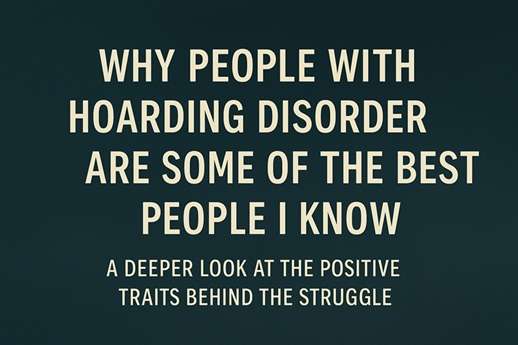If you’ve never really gotten to know someone with hoarding disorder, it’s easy to focus on the piles. The clutter. The chaos. But if you look past the stuff — really look — what you’ll often find is a person who is kind, intelligent, creative, and deeply caring. In fact, many of the people I’ve met through this work are among the best I’ve ever known. Their struggle isn’t rooted in selfishness or laziness. It’s often the result of having too much heart — not too little.
Over the years, I’ve been in a lot of living rooms filled with belongings. I’ve heard countless stories from people overwhelmed by stuff, unsure of where to begin. But what I’ve learned is that hoarding disorder doesn’t grow in a vacuum — it grows in deeply empathetic, often extraordinary people whose best qualities have been turned against them by trauma, anxiety, or loss.
Let me tell you what I see:
Altruism
People with hoarding disorder are often generous to a fault. They save items not for themselves, but because they believe someone else might need it someday. A stack of coats isn’t just clutter — it’s a future gift. A closet full of unused kitchenware isn’t waste — it’s provision for someone who might arrive in need. Their homes become safety nets for the world.
Hyper-Creativity
Many are incredibly imaginative. They see potential in everything — an old piece of wire could be sculpture; a broken chair, a future restoration project. Their minds are alive with possibility. But creativity without a place to land can become overwhelming. What was once inspiration becomes accumulation.
Concern for the Environment
The idea of throwing things “away” is painful for many. And honestly, they’re not wrong. Our culture discards far too much. People with hoarding disorder often hold onto things because they can’t bear the idea of waste — they want to reuse, repurpose, recycle. The impulse is noble. But without boundaries, it becomes a burden.
Empathy and Compassion
They care deeply. About others. About animals. About things most people overlook. It’s not uncommon for someone to keep hundreds of greeting cards or children’s toys simply because “someone loved this once.” Their sentimentality isn’t a flaw — it’s a sign of emotional depth. But it can also tether them to the past in ways that make letting go feel like betrayal.
A Quest for Perfection
Ironically, some of the most “cluttered” homes belong to people with a strong desire for order. They just want to do it right — to sort every paper, preserve every memory, fix every broken item before it’s discarded. But perfection is paralyzing. And so the sorting never begins.
When I say that people with hoarding disorder are some of the best I know, I mean it. They are not broken — they are whole in ways the world doesn’t always see. Their hearts are full. Their intentions are good. They just need help turning those intentions into a life that feels safe, manageable, and free.
